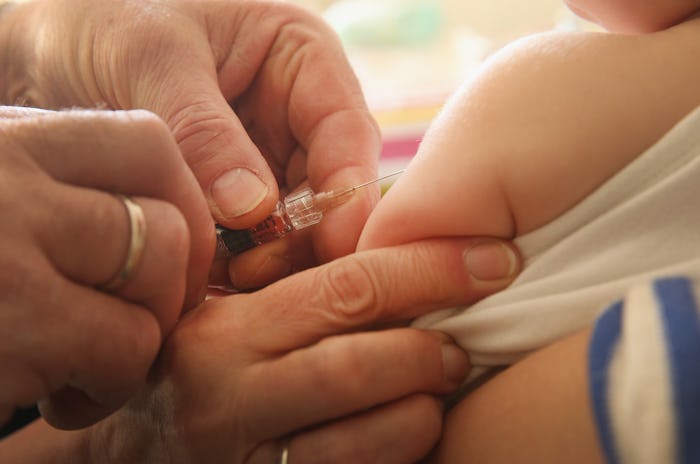Life

This One Important Fact About Vaccination Shows Why It's Critical To Public Health
While the debate between parents who vaccinate their children and those who don't want their children to be vaccinated rages on, there has been an outbreak of measles in the Memphis area that has some parents worried. In an outbreak of vaccine-preventable disease, this one important fact about vaccination makes all the difference in the world: many of the people who are affected by unvaccinated children are babies who are too young to receive vaccinations and children or adults who can't receive them because they have compromised immune systems. Those people are the ones who bear the brunt of vaccine fears and they just happen to be the ones who could face the most severe effects of diseases that vaccines protect against.
There have been six new cases of measles reported in Memphis since last Thursday, and none of the patients had been vaccinated. Two cases were of children too young to have been vaccinated, and at least one case was an adult who chose to forgo being immunized. The cases were reported in different areas of Memphis in unrelated clusters. Dr. Tim Jones, the state epidemiologist for the Tennessee Board of Health, reported that susceptible individuals have been contacted and the Department of Health has already vaccinated 100 individuals.
The measles virus is considered something of a "tracking device," an airborne virus that is highly contagious. Infants do not receive their measles-mumps-rubella shot until they are 12 months old, leaving them vulnerable to infection if they come into contact with someone carrying the disease. The measles is very serious — for children under 5, especially — and can lead to pneumonia, brain swelling, and, in extreme cases, death.
According to the Center for Disease Control and Prevention, once a child has been vaccinated, they only have about a 1 or 2 percent chance of contracting the disease they're being protected against. And each state requires that children be vaccinated not because they are trying to infringe on individual rights and freedoms, but because they need to maintain what's called a "herd immunity" to avoid a disease outbreak.
According to the National Institute of Allergy and Infectious Disease, herd immunity is;
When a critical portion of a community is immunized against a contagious disease, most members of the community are protected against that disease because there is little opportunity for an outbreak. Even those who are not eligible for certain vaccines—such as infants, pregnant women, or immunocompromised individuals—get some protection because the spread of contagious disease is contained. This is known as "community immunity."
Since a fraudulent study in 1998 was released by Dr. Andrew Wakefield claiming that vaccines caused autism in patients (Wakefield went on to lose his medical license), immunization numbers have dipped below healthy "safety thresholds," which is leaving the most vulnerable people in our society — infants, patients taking other medication (like radiation), and the small percentage of the population who are immune to the vaccine — susceptible to contracting diseases. These people rely heavily on the herd immunity to protect them.
On its website, the CDC compares immunization to wearing a seatbelt.
But you don’t wear a seatbelt because you expect to be in a serious accident; you wear it because you want to be protected in the unlikely event that you are. If you’re never in an accident, the benefit of wearing a seatbelt might be zero. But if you are, the consequences of not wearing it can be very high.
Americans live in a community that is in frequent contact with each other. Parents need to protect the little people in their communities who don't have the ability to protect themselves. They need us, and the threat of death is not something they or their families should have to face.